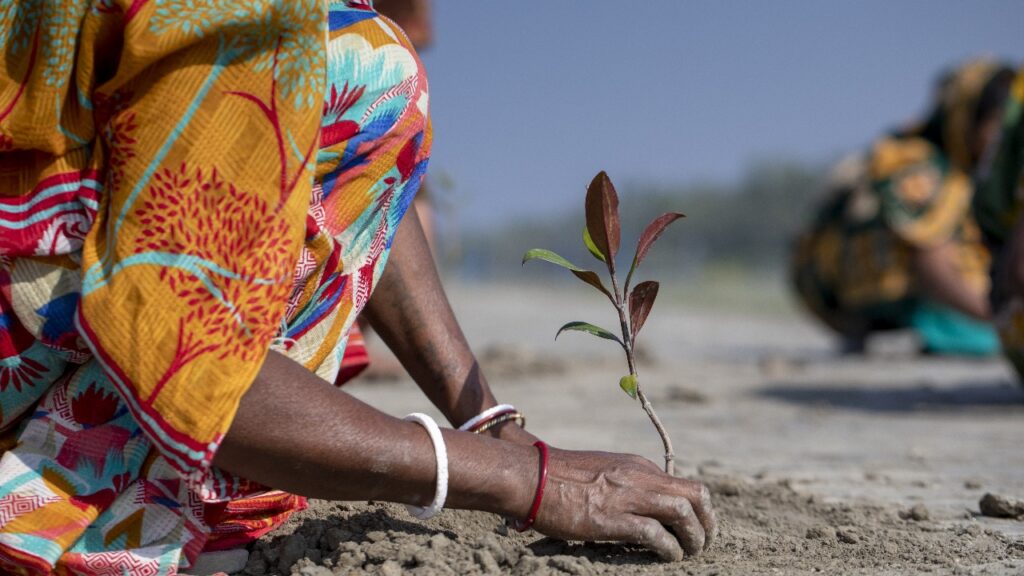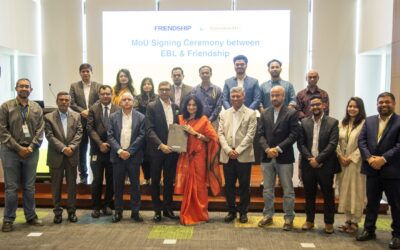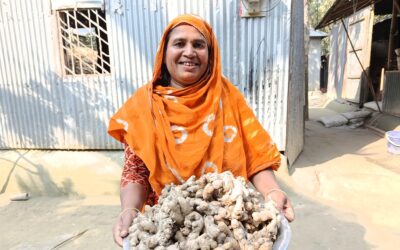
by Kazi Amdadul Haque,
November 10, 2025
Friendship has been awarded the most prestigious global environmental prize—the Earthshot Prize, which is often referred to as the Nobel Prize for the environment. The prize-giving ceremony took place in Rio de Janeiro, Brazil, in the presence of His Royal Highness the Prince of Wales, who founded the Prize with a ten-year universal goal for 2030: to drive a significant paradigm shift to repair the planet. Runa Khan, founder of Friendship, received the award to a standing ovation, stating, “Every life matters. Bangladesh is one of the most vulnerable communities in the world to climate change, and realisation leads to responsibility. At Friendship, we help people who live on the frontline of climate change with a holistic adaptation solution.”
It is a great source of pride and inspiration for the Friendship team, partners, and community, as well as all grassroots organisations and the government of Bangladesh, in their efforts to accelerate climate action. The prize was accorded in the ‘Fix Our Climate’ category, immediately before COP30, marking three decades of the climate summit. A great reflection indeed from crisis to creativity with compassion and confidence to fix the climate! Four other categories receive the prize every year, which are ‘Protect and Restore Nature’; ‘Clean Our Air’; ‘Revive Our Oceans’; and ‘Build a Waste-Free World’.
This prize recognises innovative solutions to the planet’s greatest challenges. Selected from nearly 2,500 candidates submitted by a network of 575 nominators from 72 countries, Friendship successfully underwent a rigorous scientific evaluation process. The 15 finalists were chosen based on assessments undertaken by the Earthshot Prize’s selection partners and expert advisory panel, a global group of more than 100 subject-matter experts with deep backgrounds in conservation, science, technology, business, finance, academia and policy.
The solutions recognised this year include ‘Protecting the Atlantic Forest’ by re.green, reducing air pollution by the City of Bogota, The High Seas Treaty for its most ambitious ocean initiatives, Lagos Fashion Week shaped how brands behave year-round, and Friendship’s demonstrated holistic climate adaptive solutions. Friendship’s work with vulnerable communities across Bangladesh not only prepares them for natural disasters, but also supports their health, education, livelihoods and access to public services through a holistic climate adaptation solution. There are many other breakthrough innovations, such as Matter’s microplastics filter, Quay Quarter’s upcycled skyscraper, Tenure Facilities secure ancestral land rights, Barbados’s protective approach to debt management and climate finance and many others.
The Earthshot Prize promotes and inspires optimism and mobilises decades of action for the planet by identifying and supporting groundbreaking leadership and cutting-edge solutions in five key areas. They represent the most ambitious and inspiring solutions to the planet’s greatest challenges and extend collaboration to act together. This platform also connects donors, academia and practitioners to explore, replicate and rebuild.

Founded by Runa Khan in 2002, Friendship is dedicated to helping vulnerable communities across Bangladesh not only prepare for natural disasters, but also support their health, education, livelihoods and access to public services. From its beginnings as a single floating hospital, Friendship has grown into a dedicated social purpose organisation. Today, it reaches more than 7.5 million people annually with healthcare services, provides over 8.3 million days of emergency food support, and gives more than 80,000 people access to safe drinking water in coastal areas.
Friendship is also restoring over 60 km of mangrove forests to shield villages from the worst impacts of deadly cyclones. They have already planted more than 650,000 trees across 200 hectares near Sundarbans on Bangladesh’s southern coast, protecting over 125,000 people to date. These mangrove forests also act as a major carbon sink, storing vast amounts of carbon and enabling communities to benefit from a “blue economy” future.
Friendship recognises and realises that stand-alone interventions may contribute towards uplifting life to a certain degree, but making a holistic, sustainable change is difficult within their limited scope. Adaptation requires connecting the dots of every aspect of life through an effective and accountable system. The adaptation also needs a balance between nature, life and livelihoods. Adaptation Gap Report 2025 mentioned that “action on adaptation is still inadequate. Although there is clear evidence of accelerating climate impacts, changing geopolitical priorities and increasing fiscal constraints are making it more challenging to mobilise the resources needed for climate mitigation, adaptation, and loss and damage”. However, current adaptation falls into a partial segment of the needs, while we need to connect interventions of different sectors into one framework. Friendship introduced an integrated approach to adaptation, which is well aligned with a systems approach as both connect interrelated systems across disciplinary lines and identify interactions and linkages across sectors and scales.
Friendship’s climate resilience model goes beyond disaster risk reduction; it rather encompasses a comprehensive, human-centred approach that addresses the needs of climate-induced, internally displaced people (IDPs). These individuals, to be formally recognised as ‘climate migrants’, often lose not just their homes, but their ecosystems, livelihoods, and sense of dignity. The adaptation programming is designed to restore that dignity by connecting displaced communities with dependable healthcare, inclusive education, legal identity, and social reintegration. Friendship’s Community-Initiated Disaster Risk Reduction (CIDRR) model enables communities to engage in a participatory, step-by-step process, identifying hazards, assessing vulnerabilities and capacities, and ultimately developing their own adaptation and risk reduction action plans. Beyond its programmatic interventions, Friendship’s climate resilience approach ensures that internally displaced people are strengthened both mentally and physically to face the realities of their lives. It safeguards human dignity and fosters an understanding of the ecosystem within and around them. In doing so, resilience is not just built for the future, but for the life they must live now.
By 2030, Friendship aims to tackle climate vulnerability while ensuring lasting improvements that are locally owned, sustainable and replicable across similar fragile geographies.



